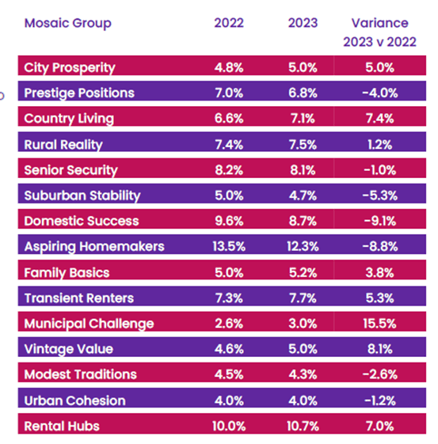Retailers, When Times are Tough – it’s Time to Ramp Up Your Marketing
Marketing is powerful but it costs money. What’s the first thing that gets cut when sales are poor? Marketing. What’s the worst department to cut back on when sales are down? You guessed it – marketing.
We were disheartened to see in The Furnishing Report that UK furniture producers' sales were down 12.5% in the same month last year. This marks the most significant year-on-year drop in 30 months. Times certainly are tough for retailers.
This is why it’s so essential that you maintain marketing that works or invest in fresh marketing that will bring you value.
Ultimately, you need to ride out the storm.
Nielsen states that when a brand stops marketing, it loses 2% of its long-term revenue. It then takes them 3-5 years to recover from this downtime. IPA research proved that companies that increased marketing during hard times reported a higher average profit and better market share growth when the economy recovered.

Why retailers shouldn’t cut their marketing budget
- Marketing is an investment
It may save costs short term by reducing your marketing spend, but long term you’re removing a source of growth and stability. Marketing is an investment and by investing in it, you’ll eventually reap the rewards. Ehrenberg-Bass Institute studied 70 brands for over 20 years and measured their advertising spend and sales. They found that when brands stop advertising for over a year, sales decline year-on-year on average by 16% the first year then 25% the second year and 36% drop in the third year. They stated that although the idea of cutting the advertising budget to increase profits may seem appealing, the evidence indicates that such a move could potentially lead to a decline in the brand's sales performance. They highlighted that smaller brands tend to suffer more than larger ones when marketing is stopped.
- You risk market share erosion
You’ll lose market share to competitors that are still marketing. McDonald’s reduced its marketing in the early 1990s and lost share to Pizza Hut and Taco Bell after seeing a 28% decrease in sales.
- Customer retention will suffer
Customers will keep returning to a solid business. Your brand will lose value if you do not market it. In tough economic times, consumers are more careful about how they spend their money and who with, so it’s essential you invest in your brand awareness. Make sure you’re still nurturing your current customers. You need to stay visible to stay relevant. Consumers take comfort in brands that advertise in tougher times as they view this as the brand still being ‘there for them.’

- Your brand will lose visibility
There are still active consumers out there. Namely homemovers. How can they find you if you’re not advertising yourself?
- You’ll be at a competitive disadvantage
Most retailers will curb marketing spend. If you choose not to, then you’ll stand out even more. Reckitt Benckiser increased its marketing budget by 25% during 2008’s recession. Company revenue grew 8% and profits increased 14%, whilst their competitors saw a 10% dip in profits.
- It will affect your future resilience
If you continue to market, you won’t have to work harder when the economy picks up. When the marketing budget is cut, you’ll find it challenging to attract new customers and you’ll be less prepared for the future.

- It reflects badly on your image
By marketing, you are projecting the image of corporate stability to customers which will improve customer loyalty. When your brand goes radio silent, it will have a long-term impact.
What marketing strategy should retailers take?
What do you need to do instead? You need to make your marketing more efficient and effective. You need to be marketing smart.
Make sure you’re targeting the right people. Use that budget to the best effect by narrowing down where you are targeting. This is why we suggest you target homemovers. The act of moving home immediately triggers consumer spending. This makes homemovers an audience that is highly active, even in a tough economic climate. They require goods and services and spend a huge amount during their homemoving journey.
.jpg?width=558&height=372&name=andrew-mead-r_X4YHAlBPo-unsplash%20(1).jpg)
Whilst there are economic pressures affecting the property market, there is still solid activity occurring. TwentyCi expects to see over 1 million transactions in total in 2023. There is a lot of activity in the wealthier members of society – a potential segment to target. In our latest Property and Homemover Report for Q3 2023, we found people are 37% more likely to buy a property over £3 million in 2023 compared to 2022 and 9.7% more likely to buy a property priced between £2 million and £3 million, year on year.
There’s also a lot of activity from the more economically challenged. In our latest Property and Homemover Report, that utilises the most accurate UK property data, we found that the surging rent prices mean that buying is actually more affordable than renting in all but one region in the UK. This suggests many more people will look to move out of rented accommodation and buy their own property. These homemovers may have previously been living in furnished accommodation and will therefore require furniture and furnishings when they transition to a homeowner.
When we applied the Experian Mosaic to the property market and our home mover data, we found that there was a significant fall in Suburban Stability, Domestic Success and Aspiring Homemakers, which are traditionally where the most activity in the property market occurs. The groups moving the most were Municipal Challenge, Vintage Value, Country Living and Rental Hubs. This is an interesting change and gives you some insight into which consumers you should be targeting.

What are cost-effective marketing channels that are highly effective?
It is well worth investing in marketing to homemovers. But what is the best way to reach them? We believe that the most cost-effective way to market to homemovers is through direct mail and mobile ad marketing. We offer both these services, so we can either provide you with information on homemovers and what stage of the process they are in, or we can set up and maintain an entire marketing campaign for you.
Direct mail
Retailers can benefit from using direct mail for the following reasons:
Highly targeted: You can reach the specific customers you want to target. In this case, those purchasing £2 million and over properties or those buying lower-priced properties.
Tangible and memorable: As direct mail is physical, it leaves more of a lasting memory and customers can retain direct mail to refer back to later.
Personalisation: Retailers can personalise direct mail pieces with the recipient's name, product recommendations, and tailored offers, creating a sense of individualised communication that will convert better than generic mail.
Less Competition: Everyone's email inbox is cluttered with retailers bombarding people. Physical mail will help you to stand out from the competition.
Measurable Results: You can track the effectiveness of their direct mail campaigns by using unique promo codes, response cards, or tracking URLs.

Mobile advertising
Retailers should use mobile advertising as part of their marketing efforts for the following reasons:
Widespread mobile usage: People are glued to their mobiles, so if you want to go where your customers are, it’s through their mobile phones.
Highly targeted: You can target specific demographics and locations.
Immediate engagement: Through click-throughs, mobile ads can provide immediate engagement, making it convenient for consumers to take action right away.
Control spending: Mobile advertising can be more cost-effective compared to traditional advertising methods. You can set specific budgets on what you want to spend.
Enhanced analytics: You can track performance through detailed analytics to optimise your mobile ad campaigns.

Why retailers should partner with TwentyCi
Don’t abandon your marketing during challenging times. You just need to be smarter with how you go about marketing. TwentyCi can help retailers by providing access to an active audience of homemovers who are always in the market for your goods and services. When someone moves home, they need new beds, new sofas, new appliances, new furnishings… the list is endless. And this audience spends a lot - £29 billion annually to be specific.
We can either provide you with home mover data or we can offer entire marketing drives for you with our direct mail or mobile advertising campaigns. These are fully trackable, so you get solid return on investment. Our typical ROI marketing results are £20:1. We have some big names in retail on our books who use our UK property data, direct mail and mobile advertising campaigns. Why not join them? Do not hesitate to get in touch with us to discuss your needs.